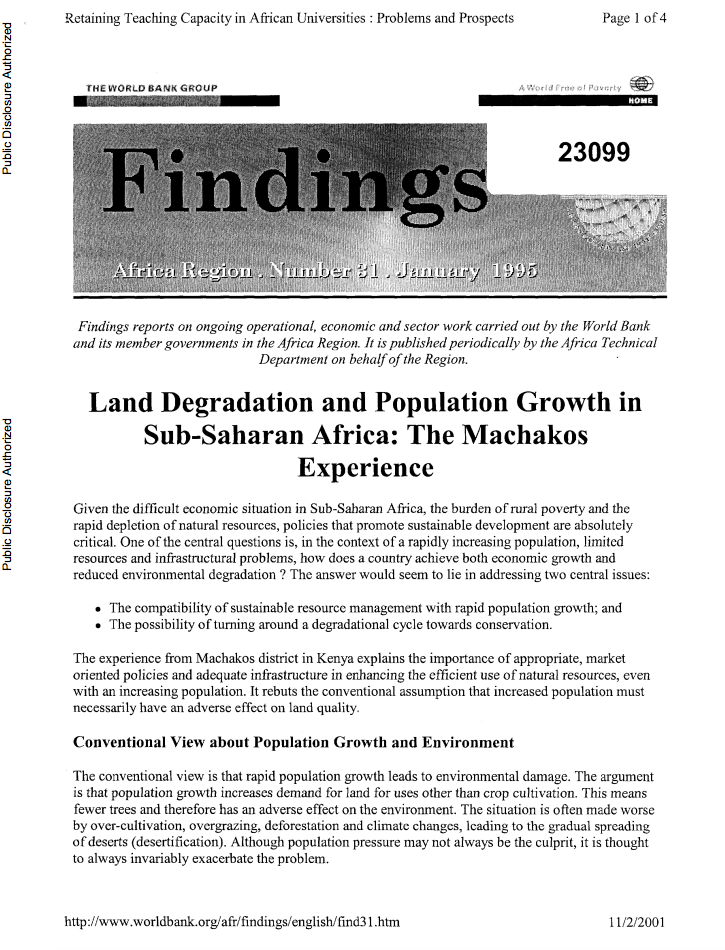The World Bank is a vital source of financial and technical assistance to developing countries around the world. We are not a bank in the ordinary sense but a unique partnership to reduce poverty and support development. The World Bank Group has two ambitious goals: End extreme poverty within a generation and boost shared prosperity.
- To end extreme poverty, the Bank's goal is to decrease the percentage of people living on less than $1.25 a day to no more than 3% by 2030.
- To promote shared prosperity, the goal is to promote income growth of the bottom 40% of the population in each country.
The World Bank Group comprises five institutions managed by their member countries.
The World Bank Group and Land: Working to protect the rights of existing land users and to help secure benefits for smallholder farmers
The World Bank (IBRD and IDA) interacts primarily with governments to increase agricultural productivity, strengthen land tenure policies and improve land governance. More than 90% of the World Bank’s agriculture portfolio focuses on the productivity and access to markets by small holder farmers. Ten percent of our projects focus on the governance of land tenure.
Similarly, investments by the International Finance Corporation (IFC), the World Bank Group’s private sector arm, including those in larger scale enterprises, overwhelmingly support smallholder farmers through improved access to finance, inputs and markets, and as direct suppliers. IFC invests in environmentally and socially sustainable private enterprises in all parts of the value chain (inputs such as irrigation and fertilizers, primary production, processing, transport and storage, traders, and risk management facilities including weather/crop insurance, warehouse financing, etc
For more information, visit the World Bank Group and land and food security (https://www.worldbank.org/en/topic/agriculture/brief/land-and-food-security1
Resources
Displaying 3396 - 3400 of 4907Political Risk : The Missing Link in Understanding Investment Climate Reform?
Political risk has once again become a
key concern of investors after the perceived openness and
liberalization of foreign direct investment (FDI) regimes in
the 1990s. Governments that do not recognize this trend pay
a high price in lost investments. Confronting political and
regulatory risks as part of the investment climate is thus
crucial for countries to make their business environments
more competitive. This note suggests reforms that can have
Vanuatu National Leasing Profile : A Preliminary Analysis
This note summarizes findings from an
analysis of Vanuatu national leasing data drawn from the
Vanuatu department of lands databases for the period of
1980-2010. It provides a preliminary indication of how much
of Vanuatu is currently under lease, where land is being
leased, how leased land is being used, the length of leases,
and the extent that leases have been subdivided. The profile
also highlights areas where data collection needs to be improved.
The Poverty and Welfare Impacts
of Climate Change Quantifying the Effects, Identifying the
Adaptation Strategies
The continued decline in global poverty
over the past 100 years particularly in the past three
decades is a remarkable achievement. In 1981, 52 percent of
the world population lived on less than $1.25 a day. By
2005, that rate had been cut in half, to 25.0 percent, and
by 2008 to 22.2 percent (World Bank 2012). Preliminary
estimates for 2010 indicate that the extreme poverty rate
has fallen further still; if follow-up studies confirm this,
PACTA : Rural Development in Honduras through Access to Land and the Development of Productive Enterprises
This note centers on the Honduras Access to Land Pilot Project (PACTA). PACTA's objectives are twofold, to: (1) facilitate access to land for landless households through the land market; and (2) promote the development of sustainable rural enterprises. PACTA's achievements, thus far, can be summarized as follows: 1) It established a working model for rural enterprise formation that leverages private sector financing. 2) Grants made to families are used to establish productive projects, leverage a proportionally large private investment, and improve access to land.
Land Degradation and Population Growth in Sub-Saharan Africa : The Machakos Experience
An issue which has generated much
concern has been the potential link between low incomes and
resource degradation. This report presents the results of a
study which investigated this question. Machakos District is
a relatively low income and agriculturally marginal district
in Kenya. Before World War II the colonial administration
was concerned that land degradation was becoming severe
under the pressure of population, aggravated by drought. The







